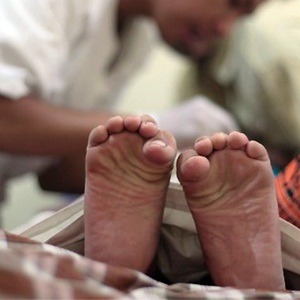
A campaign to promote male circumcision to prevent Aids infection also indirectly benefits women by reducing their risk of contracting the HIV virus, according to a study presented at the world Aids forum on Friday.
Lower risk of HIV infections
In a South African community where large numbers of men had been circumcised, women who only had sex with circumcised partners had a 15-percent-lower risk of being infected by HIV compared with women who also had uncircumcised partners, it found.
"The risk reduction is small, but it is a start," said investigator Kevin Jean of France's National Agency for Aids Research (ANRS).
Read: Decriminalisation of drug use – key to ending HIV
The study was presented on the final day of the 20th International Aids conference in Melbourne.
The World Health Organisation (WHO) recommends voluntary circumcision as an option for men in 14 sub-Saharan countries struggling with high rates of human immunodeficiency virus (HIV).
The guidelines – which have triggered a multimillion-dollar programme – are founded on evidence from three trials carried out in South Africa, Kenya and Uganda.
These concluded that circumcision resulted in a reduced HIV risk – for men – of between 50 and 60 percent.
What has been fiercely debated, though, is the impact of male circumcision on women.
Read: How circumcision reduces HIV transmission risk
Key questions asked
Key questions included whether, if large numbers of men were circumcised, the infection risk for women would fall too.
Another issue raised was that circumcised men might think wrongly that they were fully shielded from HIV and ignore advice to wear a condom – thus increasing the risk for women.
Looking at these questions, the new study enrolled 2,452 women aged between 15 and 29 who lived in Orange Farm in South Africa, where the first of the landmark trials was carried out in 2002.
Read: New estimates for HIV deaths slashed by a quarter
The women's blood was tested in 2007, 2010 and 2012, and they were also asked questions about their sexual behaviour, as was a representative sample of local men.
During this time, the prevalence of circumcision among men in the community rose from 12 percent to 53 percent.
Over 30 percent of women reported having sexual relations only with circumcised men: 17.8 percent became infected during the study period.
But among women who had sex with uncircumcised men, the prevalence of HIV was almost twice as high, at 30.4 percent.
Read: Male circumcision is linked to less sexual pleasure
Indirect benefit
In an interview with AFP, Jean said women who had only circumcised partners were relatively a small group.
Statistically speaking, they were less likely to have multiple sex partners, a well-known boost of infection risk.
This explained in part why the risk reduction – 15 percent, averaged out over the whole period – seems relatively small, Jean said.
Further work will show whether this protection improves over time as more men in the community become circumcised and uninfected younger men have the operation, he said.
There was also good news from the questions on sex behaviour: men were unlikely to engage in unprotected intercourse after being circumcised, he said.
"What we are seeing is an indirect effect," he said. "Circumcision reduces HIV among men, and if fewer men are infected, they are less likely to infect women."
Read: 'Anti-gay laws spread HIV like poison'
He stressed, though: "The message still has to be made that they use condoms."
Incentive for circumcision
An earlier presentation at the Melbourne conference found that offering men compensation in the form of food vouchers worth around $9 or $15 was a useful incentive for circumcision.
Most countries in the voluntary circumcision campaign remain far short of reaching their target numbers.
Investigators have found that many men are deterred by the loss of wages from time off work to have the operation, and the cost of travelling to and from the clinic to have it carried out.
The protective effect from circumcision appears to lie in removal of cells in the foreskin which are especially vulnerable to penetration by HIV.
Look: How the foreskin ups HIV risk - in pictures
Read more:
The A-Z of circumcision
Could legalising sex work stop HIV spread?
Clinton advocates more efficient use of HIV resources




 Publications
Publications
 Partners
Partners











